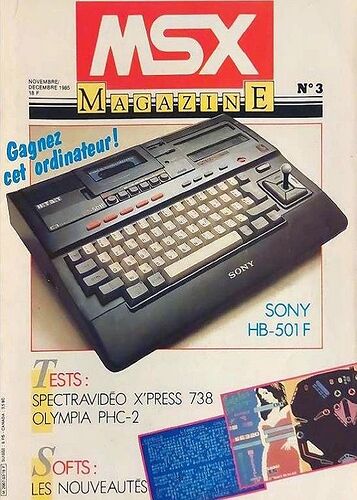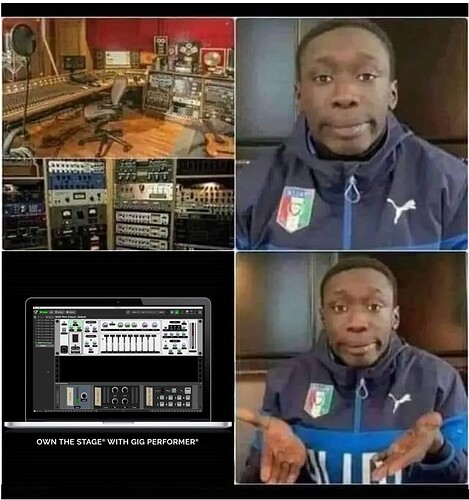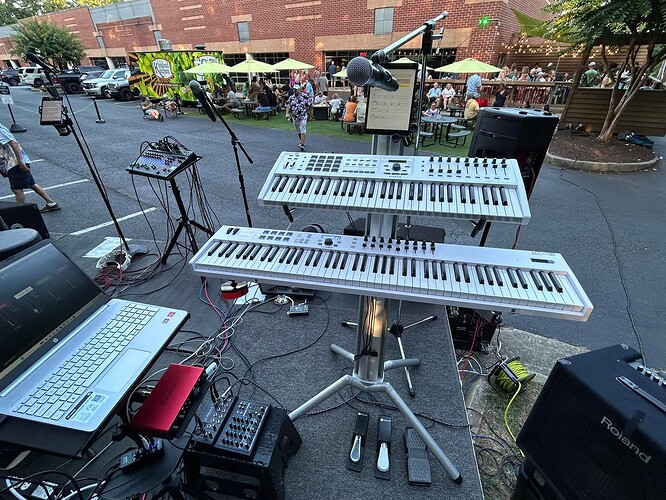Hey, that was an MSX, I owned an MSX too and made my first publication ever (a source code!) in MSX Magazine, I was 15 years old ![]()
I remember the sprites used for graphics on MSX
MSX was an attempt at standardisation that was not successful.
However, many manufacturers responded to the call, such as Canon, Casio, Panasonic, Philips, Sanyo, Schneider, Sony, Toshiba or Yashica.
@David-san I myself read and copied in MSX Magazine hundreds of lines of code that I didn’t understand at all, @pianopaul only to display a bad sprite on the screen after several days…
On the other hand, making music on the CX5M was a great joy: playing on a keyboard or on a guitar plugged into a midi microphone and seeing the notes and chords displayed on a score made me proud to be able to produce a score without knowing how to read or write a single note. ![]()
In retrospect, the musical result is quite a performance, considering that it was done with a Z80 processor running at 3.58 MHz (not GHz ![]() ), a 32kb ROM, a 32kb RAM, and that once the scoring software was loaded, there was exactly 8kb left to create an 8 track song.
), a 32kb ROM, a 32kb RAM, and that once the scoring software was loaded, there was exactly 8kb left to create an 8 track song.
I can’t help but let you hear you two examples of my first recordings made with 8kb and played without overdub. But the pitchbend (and all the continuous controllers) had to be played sparingly so as not to consume all the available memory in few seconds…
(1985 recordings from a cassette recorder - Yamaha CX5M, Yamaha DX7, Yamaha RX11, MutliFX Ibanez UE405)
Very nice (also the music) …
I had a Commodore 128 (sort of 64) myself, but I also had an MSX for some time.
It was indeed quite a challenge to make a song with the limited amount of memory. The issue is that to get a better quality, the resources need to be multiplied with factors.
And actually, it’s still interesting to see that music production still puts a lot of boundaries on nowadays multi GHz processors, GB Rams and GB/TB SSDs.
But even hardware devices (like the Korg Kronos) cannot compete software wise with the speed VST’s are developed and the resources available in laptop cq desktops.
Here’s a quote:
This adds to this blog, as it explains efficiency in programming sounds vs hardware. ![]()
Anyone using it?
I’m asking because I don’t see it discussed much on reddit and there’s no existing community that I could find. I’ve been getting into it over the past few weeks setting up my live performance rig and I have to say I love it so far. The visualized nodes are great and my CPU use is at an all time low. I get the ocassional issue loading up super plugin-heavy project files, but once they’re loaded everything seems super stable.
By “it”, are you referring to Gig Performer or a particular plugin?
YouTube comment by James Brady
My Kronos flamed out twice at our last gig (tech said it would need a motherboard - not happening!). Just got the Arturia KeyLab 88 today and downloaded Gig Performer. Time to get to work. All these videos helped to convince me to take the leap, so thank you. Wish me luck!
Another one converting from Korg Kronos to Gig Performer
Craig Beaumont wrote:
Thank you, Brett and Sam! Absolutely one of the best demonstrations of the power and utility of Gig Performer. Simultaneously playing parts often done by 3 players, combines knowing what one hopes to achieve, ones physicality, thinking out of the box and the utility of GP in enabling a great musical performance. Kudos!
Link: https://www.youtube.com/live/RL2sbbOb7Mk?feature=share
–
Indeed amazing when you can not only reduce number of keyboards (or pedals, etc.) but also number of musicians! ![]()
Are you tired of fumbling with hardware mic switches during your live performances? Say goodbye to the hassle and hello to a game-changing solution: Gig Performer Virtual Software. In this video, we’ll dive into how Gig Performer can revolutionize your live performance setup.
Learn more here.
I built my last several desktops and they have served me well, but in terms of a laptop, I’m a bit lost. The only reason I am considering one, is because I have been having a lot of fun with Gig Performer and since having a piece of live-orientated software to run Kontakt and everything else, My Roland Fantom is feeling clunky and inelegant. I “want” to be just as happy playing a hardware synth, and a flagship one at that, but there really is no comparison, especially when you figure all the effects and such. Building custom or cover sounds in Gig Performer is great fun, and building them in the Fantom, especially in the light of Gig Performer, is tedious at best.
(source)
Ken Deans, running Gig Performer 5.
He is 100% VST for 3+ years now!
I have not had an issue during a gig. I did originally have some issues trying to repurpose an old laptop. One piece of advice I’ll share…. secure a good laptop and use it exclusively for your VST/Gig Performer rig! That’s worked well for me.
–
Happy to see more users switching to Gig Performer from hardware.
I was very late with the change towards VSTs. Main reasons: I tried it about or more than 10 years ago and at that time my Korg Kronos was obviously better. Because of that I waited long until Korg dared to call the Nautilus their new flagshop, meaning when my Kronos would breakdown there is not a good replacement.
Then I checked into VSTs and very shortly after I found GigPerformer. Now I have for the same amount of money as my old Kronos (which I don’t use anymore), a laptop, two keyboards, audio interface, and of course Gig Performer.
I had some learning curve (no experience with VSTs, and host controllers), but I probably would have switched years earlier, as the advantages are so many above hardware keyboards:
- I can chose now from 10K+ ‘engine models’ instead of the built in 9 of a Korg Kronos.
- I have 1.5 TB SSD instead of 30 GB (SSD ) on a Kronos, which is also only slightly extendable.
- I can use any keyboard / masterkeyboard which I want, and replacement will cost me just a few hundred euros instead of a new Kronos.
- I can do way more than before (metronome, time keeping, DMX control)
- The sounds are way better than before due to the sample sizes of libraries (especially noticable with natural instruments).
- Programming via a laptop screen is so much easier than a ‘relatively’ small Kronos screen.
- I can way easier change the order of set lists
- It is much easier to change / add sounds (due to Gig Performer’s wiring diagrams).
- It is extendable beyond imaginations (also due to Gig Performer’s scripting language).
- I only have to bring my laptop back and forth to the rehearsal room instead of the entire Kronos.
Yes, that is the downside of staying “old school”
Nick Pollard
First time out using Arturia midi controllers
connected to Gig Performer 5.
Worked like a charm, everything super easy to
connect and set up…
Replacing lugging a Jupiter 80 and system 8 and Korg M1.
It’s a revolution!
(Source: Keyboard Players in Cover Bands)
One more user migrating from hardware to Gig Performer → link.
–
In the comments, I saw other users coming from hardware, e.g. John S. Hagewood:
I just started gigging with GP (from hardware, Nords and such) in 2023 and it’s been a total game changer for me.





